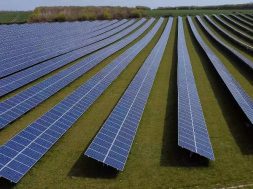
Local solar manufacturers seek ‘Safeguard Duty’
Badly hit by a shrinking market and idle capacity, local manufacturers of solar cells and modules have decided to approach the government again seeking to impose a ‘safeguard duty’ on imported equipment.
They had petitioned the Ministry of Trade and Commerce in early June seeking an anti-dumping duty on solar imports but have not received any response so far. They now plan to petition the Director General of Safeguards in the same ministry to impose a duty of 10 US cents (RS6.50) per watt on imported cells and modules.
Solar manufacturers are getting desperate as they say they have been marginalised in the country’s ambitious solar energy programme. In 2016-17, as much as 5,525 MW of solar projects were set up in country, but about 90% of the solar cells and modules used were imported, mainly from China, Malaysia and Taiwan.
Thanks to the scale of the manufacturing units in those countries and supportive government policies there, they can provide solar cells and modules at prices 10-20% cheaper than their Indian counterparts. India’s imports of solar cells and modules rose 36% in 2016-17 to $3.2 billion.
Total domestic module manufacturing capacity is 8,113 MW of which 5,286 MW are operational. But actual manufacturing in 2016-17 was 1,000-1,500 MW, due to lack of demand.
Previously, the local industry was guaranteed at least partial off-take thanks to the ‘domestic content requirement’ (DCR) in theNational Solar Mission, under which some solar projects had to be compulsorily built using local cells and modules, with higher tariffs permitted for the power they produced. But with the WTO having ruled last year that DCR amounted to an unfair trade practice, no fresh DCR projects are being initiated.
Imposing anti-dumping, or safeguard, duty on imports will raise the cost of solar installations and thereby increase tariffs. Solar tariffs have been falling steeply in the past two years, and protective steps may reverse the trend. But, local manufactures see the impact to be limited. “If, say, a 20% safeguard duty is imposed, it will add about 11% to the total project cost, raising the tariff from `2.44 to around `2.70-3 per kwH, which is not all that much,” said a leading manufacturer, defending the petition “Safeguard duty is allowed for a maximum of five years, which will give local industry time to find its feet.”
Overseas manufacturers, as well as solar developers, do not agree. “Dumping is an unfair trade practice, and if it is taking place, local manufacturers have a right to petition against it,” said Sujoy Ghosh, India CEO of US-headquartered First Solar, which makes solar equipment and sets up projects. “But safeguard duty creates entry barriers for global manufacturers even when they are transacting in a fair manner.”
Source: ET
















